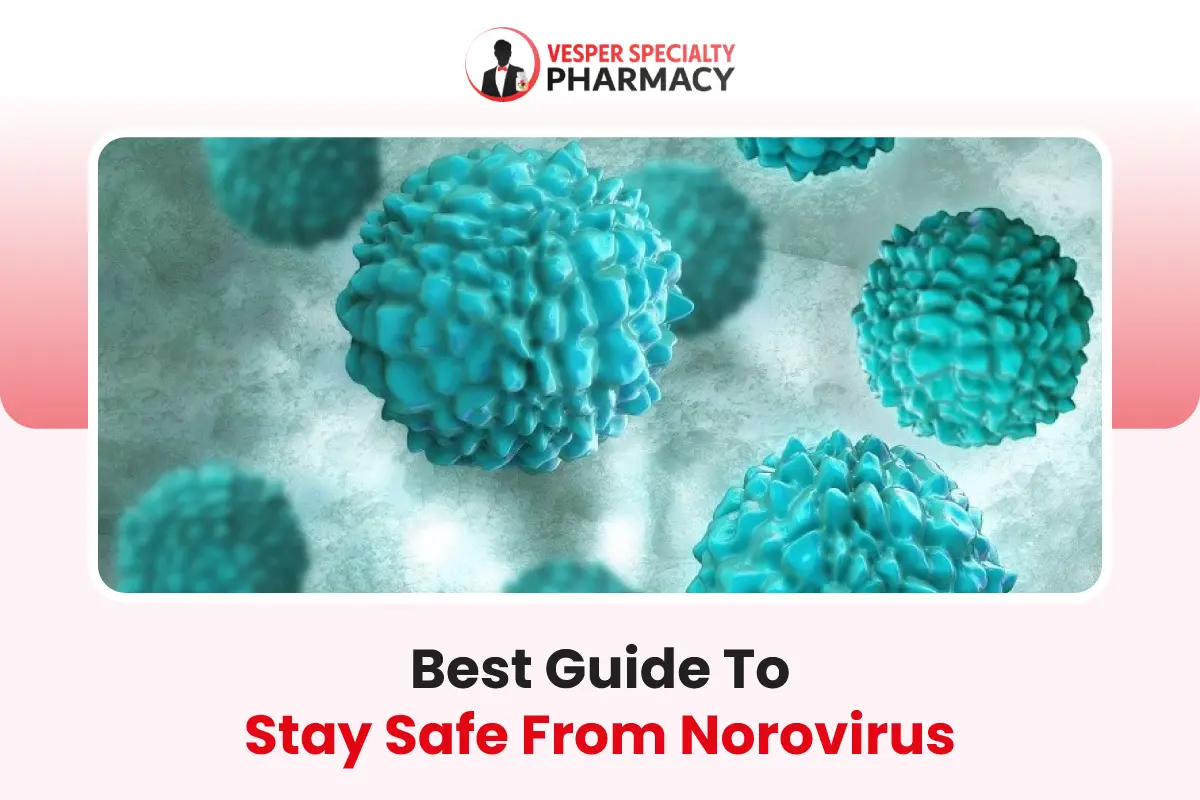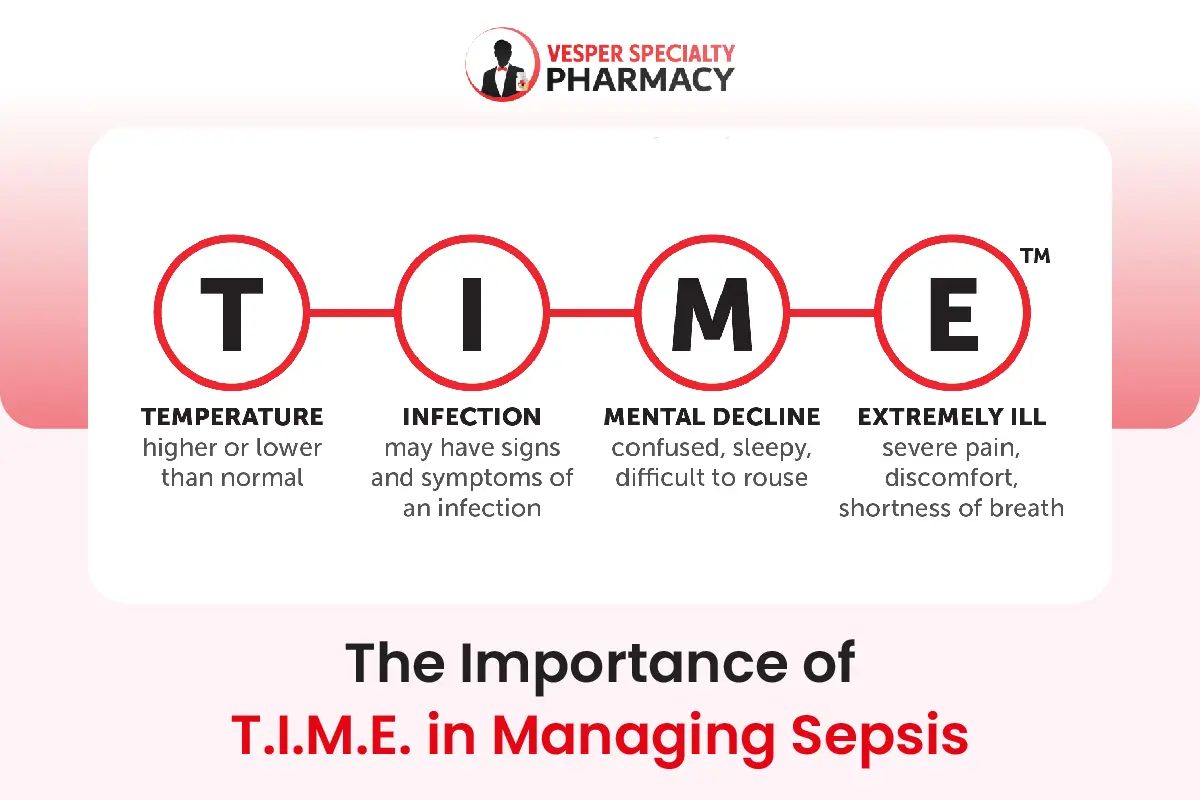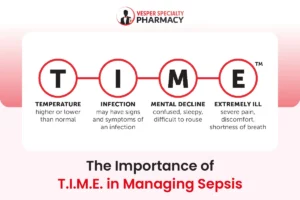Norovirus is a highly contagious virus that causes gastroenteritis, commonly known as the stomach flu. It’s one of the most common causes of foodborne illness and outbreaks of gastroenteritis worldwide. Despite its small size, norovirus packs a powerful punch, spreading rapidly and causing significant discomfort.
Table of Contents
What Is Norovirus and How Common It Is?
Norovirus belongs to the Caliciviridae family and is made up of a group of related viruses. It primarily affects the stomach and intestines, leading to symptoms such as nausea, vomiting, diarrhea, and stomach cramps.
While the illness is typically short-lived and resolves within a few days, it can be severe, particularly in vulnerable populations such as young children, older adults, and individuals with weakened immune systems.
Norovirus is incredibly common, with outbreaks occurring frequently in various settings such as schools, cruise ships, hospitals, and restaurants. According to the Centers for Disease Control and Prevention (CDC), norovirus is responsible for around 19-21 million cases of acute gastroenteritis in the United States alone each year. [1]
Signs of Norovirus Infection
Recognizing the signs and symptoms of norovirus infection is essential for prompt identification and containment of outbreaks. Common symptoms of norovirus infection include:
- Sudden onset of nausea
- Forceful vomiting
- Watery diarrhea
- Abdominal cramps
- Low-grade fever
- Muscle aches
Symptoms typically appear 12 to 48 hours after exposure to the virus and can persist for one to three days. In severe cases, dehydration may occur, particularly in young children, older adults, and individuals with weakened immune systems.
How Norovirus Spreads from Person to Person
Norovirus spreads easily from person to person through several routes of transmission. The most common modes of transmission include:
- Direct Contact: Norovirus can spread through direct contact with an infected person, such as shaking hands or caring for someone who is ill. The virus can also be present in vomit and feces, increasing the risk of transmission through contact with contaminated surfaces.
- Consumption of Contaminated Food or Water: Norovirus can contaminate food and water, especially if handled by infected individuals or prepared in unsanitary conditions. Consuming contaminated food or water can lead to infection.
- Contact with Contaminated Surfaces: Norovirus can survive on surfaces for extended periods, allowing it to spread when individuals touch contaminated surfaces and then touch their mouths, noses, or eyes.
Preventing the spread of norovirus requires strict adherence to hygiene practices, including thorough handwashing, proper food handling, and disinfection of surfaces.
How to Stop Norovirus from Spreading
Preventing the spread of norovirus requires a combination of proactive measures aimed at minimizing the risk of transmission. By implementing simple yet effective strategies, individuals can play a vital role in reducing the spread of this highly contagious virus.
#1 Step: Keeping Our Hands Clean: The Best Way to Stay Safe
Easy Steps for Washing Hands Properly: Proper handwashing is one of the most effective ways to prevent norovirus transmission. Follow these steps for thorough handwashing:
- Wet your hands with clean, running water.
- Apply soap and lather your hands by rubbing them together, including the backs of your hands, between your fingers, and under your nails.
- Scrub your hands for at least 20 seconds.
- Rinse your hands thoroughly under running water.
- Dry your hands with a clean towel or air dry them.
When to Use Hand Sanitizer: In situations where soap and water are not readily available, hand sanitizer can be used as an alternative. Choose a hand sanitizer that contains at least 60% alcohol and apply it generously to all surfaces of your hands.
Rub your hands together until the sanitizer is completely dry. Hand sanitizer is particularly useful when caring for someone who is sick or when in public places where germs may be present.
#2 Step: Keeping Our Surroundings Clean: A Big Help in Preventing The Spread
Cleaning Surfaces Often to Get Rid of Germs: Norovirus can survive on surfaces for extended periods, making regular cleaning and disinfection essential. Use a disinfectant cleaner to wipe down frequently touched surfaces such as doorknobs, countertops, and light switches. Pay special attention to surfaces in areas where food is prepared or consumed.
Being Careful with Food to Avoid Getting Sick: Proper food handling is critical for preventing norovirus contamination. Wash fruits and vegetables thoroughly before consuming them, and cook foods to their recommended internal temperatures to kill any harmful pathogens.
When dining out, choose reputable establishments with good hygiene practices, and avoid consuming raw or undercooked foods, especially shellfish and salads prepared in advance.
#3 Step: Taking Care of Ourselves: Simple Habits to Lower the Risk
Handling Food Safely at Home and When Eating Out: Practice good food hygiene habits both at home and when dining out. Wash your hands before and after handling food, and use separate cutting boards and utensils for raw meats and produce. Store food properly in the refrigerator and promptly refrigerate leftovers to prevent bacterial growth.
Staying Away from Sick People Whenever Possible: If you know someone who is experiencing symptoms of norovirus or any other contagious illness, try to limit close contact with them until they are no longer contagious.
Avoid sharing food, drinks, utensils, or personal items with individuals who are sick, and encourage them to practice good hygiene to prevent further spread of the virus.
Getting Ready for Norovirus Outbreaks
Norovirus outbreaks can occur unexpectedly and spread rapidly, posing a significant risk to public health. Being prepared and knowing how to respond to potential outbreaks is essential for minimizing the impact and containing the spread of the virus.
What to Look Out for When an Outbreak Might Be Happening
Recognizing the early signs of a norovirus outbreak can help individuals and communities take proactive measures to prevent further spread. Some indicators that an outbreak might be occurring include:
- An increase in the number of individuals experiencing symptoms of norovirus, such as nausea, vomiting, and diarrhea.
- Reports of norovirus-related illnesses from multiple sources, such as schools, workplaces, or healthcare facilities.
- Clusters of illness occur within a specific timeframe and geographic area.
- Confirmation of norovirus cases through laboratory testing.
Staying informed about local health alerts and monitoring for any unusual patterns of illness can help identify potential outbreaks early on.
Steps to Take If We Think There’s an Outbreak Where We Live or Work
If there is suspicion or confirmation of a norovirus outbreak in our community or workplace, it’s crucial to take swift and decisive action to contain the spread of the virus. Here are steps to consider:
- Notify Relevant Authorities: Report suspected or confirmed cases of norovirus to local health authorities or workplace supervisors. Provide detailed information about the number of affected individuals, symptoms, and potential sources of exposure.
- Implement Control Measures: Take immediate steps to prevent further transmission of norovirus. This may include isolating sick individuals, disinfecting contaminated surfaces, and implementing enhanced hygiene protocols such as handwashing and the use of hand sanitizer.
- Communicate with Affected Individuals: Keep individuals informed about the situation and provide guidance on preventive measures they can take to protect themselves and others. Encourage sick individuals to stay home until they are no longer contagious and to seek medical attention if necessary.
- Collaborate with Healthcare Professionals: Work closely with healthcare providers and public health authorities to coordinate response efforts and ensure appropriate medical care for affected individuals. Follow any recommendations or guidelines provided by health experts for managing the outbreak effectively.
Why it’s Important to Share Information and Work Together with Health Experts?
Sharing information and collaborating with health experts are essential components of an effective response to norovirus outbreaks. Here’s why:
- Timely Intervention: Early detection and reporting of outbreaks allow for prompt intervention and implementation of control measures, reducing the spread of norovirus and mitigating its impact on public health.
- Resource Allocation: Sharing information about the scope and severity of outbreaks helps allocate resources effectively, ensuring that healthcare facilities and response teams have the necessary support to manage cases and contain transmission.
- Preventative Measures: Collaboration with health experts enables the dissemination of accurate information and guidance on preventive measures, empowering individuals and communities to take proactive steps to protect themselves from norovirus infection.
- Data Collection and Analysis: Sharing data and collaborating with health authorities contribute to ongoing surveillance efforts and epidemiological research, enhancing our understanding of norovirus transmission dynamics and informing future prevention strategies.
By sharing information and working together with health experts, we can strengthen our collective response to norovirus outbreaks and minimize their impact on public health and well-being.
Risks of Norovirus During Travel
Traveling exposes individuals to various environments and increases the risk of encountering norovirus. Understanding the risks associated with norovirus during travel and taking appropriate precautions are essential for a safe and enjoyable journey.
Traveling presents several factors that can contribute to the spread of norovirus:
Close Proximity to Others: In crowded transportation facilities such as airplanes, buses, trains, and cruise ships, individuals may come into close contact with others who are infected with norovirus, increasing the risk of transmission.
Shared Facilities: Accommodation options such as hotels, resorts, and hostels often involve sharing common areas, dining facilities, and recreational spaces, where norovirus can easily spread through contaminated surfaces or food.
Unfamiliar Food and Water Sources: Consuming food or beverages from unfamiliar sources, particularly in regions with inadequate sanitation or hygiene standards, can increase the risk of norovirus infection from contaminated food or water.
Limited Access to Healthcare: Traveling to remote or international destinations may pose challenges in accessing timely medical care in the event of illness, potentially complicating the management of norovirus symptoms.
Precautions to Take While Traveling to Minimize The Risk of Norovirus Infection
To reduce the risk of norovirus infection while traveling, consider the following precautions:
Practice Good Hand Hygiene
Wash your hands frequently with soap and water, especially before eating, after using the restroom, and after touching surfaces in public areas. If soap and water are not available, use alcohol-based hand sanitizer with at least 60% alcohol content.
Be Cautious with Food and Water
Choose reputable food establishments with good hygiene practices, and opt for freshly prepared foods served hot. Drink bottled water or use water purification methods such as boiling or using water purification tablets in areas with questionable water quality.
Avoid Close Contact with Sick Individuals
If possible, maintain a safe distance from individuals who appear to be ill, particularly if they are exhibiting symptoms of norovirus such as vomiting or diarrhea. Avoid sharing food, utensils, or personal items with others.
Disinfect Frequently Touched Surfaces
Use disinfectant wipes or sprays to clean commonly touched surfaces in your accommodation, transportation, and other public areas. Pay special attention to surfaces such as door handles, light switches, and tabletops.
Pack Necessary Medications
Bring along any prescribed medications or over-the-counter remedies for treating gastrointestinal symptoms, such as anti-diarrheal medication or electrolyte solutions to prevent dehydration. Consult with a healthcare provider before traveling, especially if you have underlying medical conditions.
What To Do If You Become Ill While Traveling
If you develop symptoms of norovirus or any other gastrointestinal illness while traveling, take the following steps:
- Stay Hydrated: Drink plenty of fluids to prevent dehydration, opt for water, clear broths, or oral rehydration solutions.
- Rest: Allow your body to rest and recuperate by avoiding strenuous activities.
- Isolate Yourself: If possible, stay in your accommodation and avoid close contact with others to prevent further spread of illness.
- Seek Medical Attention: If your symptoms are severe or persist for more than a few days, seek medical attention from a healthcare provider or local medical facility. Follow their recommendations for treatment and management of your symptoms.
By taking proactive measures and being prepared, travelers can minimize the risk of norovirus infection and enjoy a safe and healthy journey.
Norovirus in Hospitals and Clinics
Norovirus poses unique challenges in healthcare settings due to its highly contagious nature and potential to cause outbreaks among patients and healthcare workers. Implementing effective strategies to prevent norovirus transmission is crucial for maintaining patient safety and minimizing the spread of infection within hospitals and clinics.
Challenges of Dealing with Norovirus in Healthcare Places
Managing norovirus in healthcare settings presents several challenges, including:
High Transmission Rates: Norovirus spreads rapidly in healthcare facilities, where patients are often close to one another and may have weakened immune systems, making them more susceptible to infection.
Environmental Persistence: Norovirus can survive on surfaces for extended periods, posing a persistent risk of transmission through contact with contaminated surfaces or medical equipment.
Staffing Shortages: Norovirus outbreaks can strain healthcare resources and lead to staffing shortages as healthcare workers become ill or are required to implement additional infection control measures.
Vulnerable Patient Populations: Certain patient populations, such as the elderly, immunocompromised individuals, and those with underlying medical conditions, are at increased risk of developing severe complications from norovirus infection, necessitating heightened vigilance and preventive measures.
Smart Ways to Stop Norovirus from Spreading in Hospitals
To prevent norovirus transmission within hospitals and clinics, healthcare facilities can implement the following strategies:
Strict Adherence to Infection Control Protocols: Ensure that healthcare workers follow established infection control practices, including hand hygiene, environmental cleaning, and the use of personal protective equipment (PPE) such as gloves and gowns when caring for patients with suspected or confirmed norovirus infection.
Enhanced Environmental Cleaning: Implement rigorous cleaning and disinfection protocols for patient care areas, common areas, and high-touch surfaces using EPA-approved disinfectants effective against norovirus. Focus on frequently touched surfaces such as doorknobs, bedside tables, and medical equipment.
Isolation of Affected Patients: Promptly isolate patients with suspected or confirmed norovirus infection to prevent further spread within the healthcare facility. Implement droplet precautions and restrict visitor access to reduce the risk of transmission.
Education and Training: Provide comprehensive education and training to healthcare workers on the signs and symptoms of norovirus infection, proper infection control practices, and the importance of early detection and reporting of outbreaks.
Why Healthcare Workers Need to Know How to Handle Norovirus Safely
Healthcare workers play a critical role in preventing norovirus transmission and safeguarding patient safety. It is essential for healthcare workers to understand how to handle norovirus safely for the following reasons:
- Protecting Vulnerable Patients: Healthcare workers have a duty to protect vulnerable patient populations from norovirus infection and its potentially severe consequences.
- Minimizing Healthcare-associated Infections: By adhering to strict infection control measures, healthcare workers can minimize the risk of norovirus transmission within healthcare settings and prevent healthcare-associated infections.
- Maintaining Continuity of Care: Preventing norovirus outbreaks in healthcare facilities helps ensure continuity of care for patients and avoids disruptions to essential healthcare services.
- Protecting Healthcare Workers: Knowledge of proper infection control practices and personal protective measures helps safeguard healthcare workers from norovirus infection and minimizes the risk of occupational exposure.
Dealing with Norovirus at Home
When norovirus strikes, managing the illness at home becomes crucial for preventing further spread within the household and promoting the speedy recovery of affected individuals. Here are some practical tips for effectively dealing with norovirus at home:
Tips for Taking Care of Someone at Home Who Has Norovirus
Isolation: Encourage the sick individual to stay in a separate room with a designated bathroom, if possible, to minimize the risk of spreading the virus to other household members. Provide them with essential items such as tissues, a trash can, and hand sanitizer within easy reach.
Hydration: Ensure the sick individual drinks plenty of fluids to prevent dehydration caused by vomiting and diarrhea. Offer small, frequent sips of water, clear broth, oral rehydration solutions, or electrolyte drinks to replenish lost fluids and electrolytes.
Rest: Encourage the sick individual to get plenty of rest to help their body recover from the illness. Avoid strenuous activities and provide a comfortable environment conducive to rest and relaxation.
Nutrition: Offer bland, easy-to-digest foods such as toast, crackers, bananas, rice, and applesauce (BRAT diet) to soothe the stomach and provide essential nutrients. Avoid fatty, spicy, or heavily seasoned foods that may exacerbate gastrointestinal symptoms.
Personal Hygiene: Emphasize the importance of proper hand hygiene to prevent further spread of norovirus within the household. Encourage frequent handwashing with soap and water, especially after using the restroom, before eating, and after handling contaminated items.
Keeping Our Family Safe From Getting Norovirus at Home
Disinfection: Regularly clean and disinfect frequently touched surfaces and objects in the home, such as doorknobs, light switches, countertops, and bathroom fixtures. Use EPA-approved disinfectants effective against norovirus and follow the manufacturer’s instructions for proper application.
Shared Spaces: Minimize close contact and shared activities among household members to reduce the risk of norovirus transmission. Encourage family members to practice good hand hygiene and avoid sharing personal items such as towels, utensils, and drinking glasses.
Laundry: Wash soiled clothing, bedding, and towels in hot water with detergent and bleach if possible to kill any lingering norovirus particles. Use disposable gloves when handling contaminated laundry and wash your hands thoroughly afterward.
Food Preparation: Practice safe food handling and preparation techniques to prevent foodborne transmission of norovirus within the household. Wash fruits and vegetables thoroughly, cook foods to their recommended internal temperatures, and avoid preparing food while symptomatic.
When it’s Time to Get Medical Help if We Have Norovirus Symptoms
Seek medical attention if you or a family member experience severe symptoms of norovirus or signs of dehydration, including:
- Persistent vomiting that prevents you from keeping fluids down.
- Diarrhea lasting more than a few days or accompanied by severe abdominal pain.
- Signs of dehydration such as dry mouth, decreased urine output, dizziness, or lightheadedness.
- High fever or signs of infection such as chills or muscle aches.
- Symptoms worsen despite home care measures or if you have underlying medical conditions that may increase the risk of complications.
Your healthcare provider can offer guidance on managing norovirus symptoms, provide supportive care, and determine if additional medical intervention is necessary. Remember to follow any instructions provided by your healthcare provider and continue practicing good hygiene to prevent the further spread of norovirus within the household.
Conclusion
As we wrap up our exploration of norovirus and its prevention, it’s important to reflect on the key points discussed and reinforce the importance of vigilance in protecting ourselves and others from norovirus infection.
Armed with knowledge about norovirus and practical strategies for prevention, You can feel more confident in your ability to protect yourselves and your loved ones from norovirus infection. Understanding the nature of the virus and how it spreads empowers you to make informed decisions and take proactive steps to minimize the risk of transmission.
Reference
- Hall AJ, Lopman BA, Payne DC, Patel MM, Gastañaduy PA, Vinjé J, Parashar UD. Norovirus disease in the United States. Emerg Infect Dis. 2013 Aug;19(8):1198-205. [PMC free article] [PubMed]














